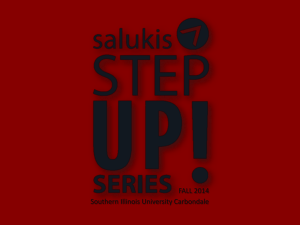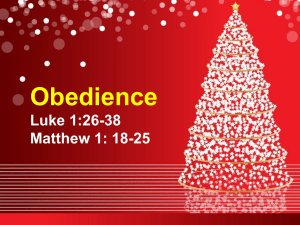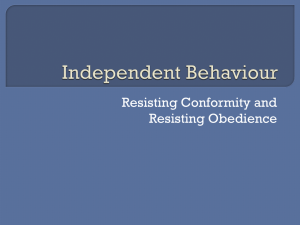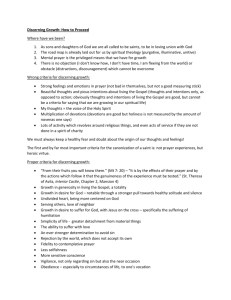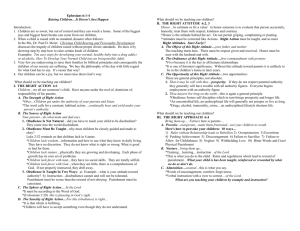MARY EUPHRASIA AND THE VOWS OF RELIGION
advertisement
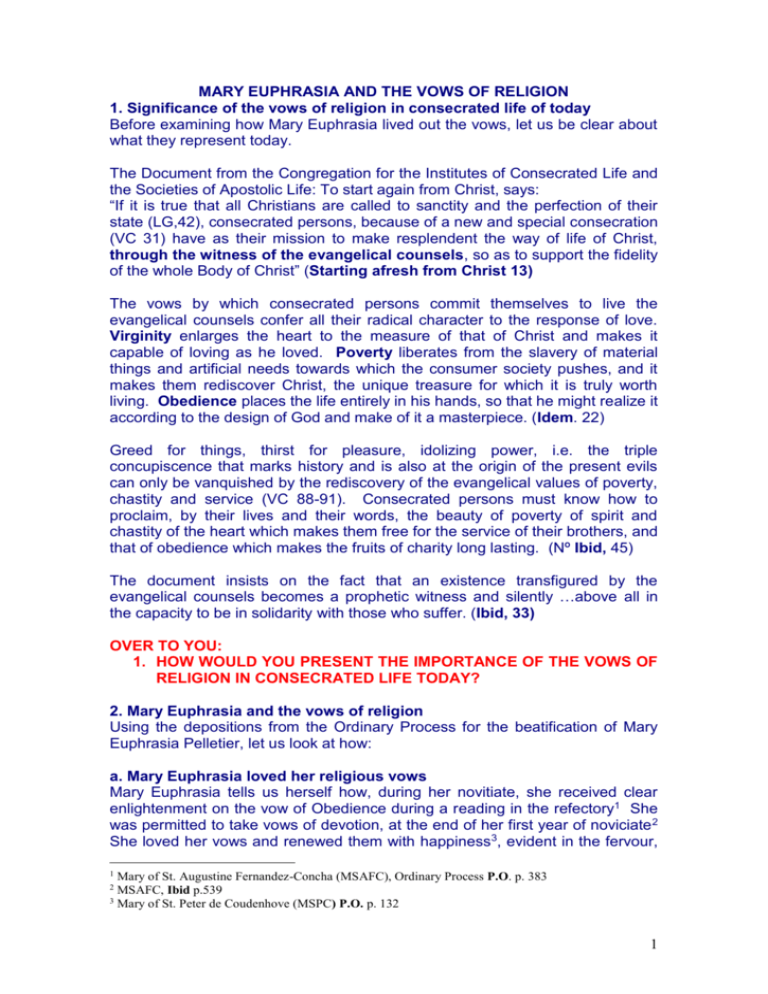
MARY EUPHRASIA AND THE VOWS OF RELIGION 1. Significance of the vows of religion in consecrated life of today Before examining how Mary Euphrasia lived out the vows, let us be clear about what they represent today. The Document from the Congregation for the Institutes of Consecrated Life and the Societies of Apostolic Life: To start again from Christ, says: “If it is true that all Christians are called to sanctity and the perfection of their state (LG,42), consecrated persons, because of a new and special consecration (VC 31) have as their mission to make resplendent the way of life of Christ, through the witness of the evangelical counsels, so as to support the fidelity of the whole Body of Christ” (Starting afresh from Christ 13) The vows by which consecrated persons commit themselves to live the evangelical counsels confer all their radical character to the response of love. Virginity enlarges the heart to the measure of that of Christ and makes it capable of loving as he loved. Poverty liberates from the slavery of material things and artificial needs towards which the consumer society pushes, and it makes them rediscover Christ, the unique treasure for which it is truly worth living. Obedience places the life entirely in his hands, so that he might realize it according to the design of God and make of it a masterpiece. (Idem. 22) Greed for things, thirst for pleasure, idolizing power, i.e. the triple concupiscence that marks history and is also at the origin of the present evils can only be vanquished by the rediscovery of the evangelical values of poverty, chastity and service (VC 88-91). Consecrated persons must know how to proclaim, by their lives and their words, the beauty of poverty of spirit and chastity of the heart which makes them free for the service of their brothers, and that of obedience which makes the fruits of charity long lasting. (Nº Ibid, 45) The document insists on the fact that an existence transfigured by the evangelical counsels becomes a prophetic witness and silently …above all in the capacity to be in solidarity with those who suffer. (Ibid, 33) OVER TO YOU: 1. HOW WOULD YOU PRESENT THE IMPORTANCE OF THE VOWS OF RELIGION IN CONSECRATED LIFE TODAY? 2. Mary Euphrasia and the vows of religion Using the depositions from the Ordinary Process for the beatification of Mary Euphrasia Pelletier, let us look at how: a. Mary Euphrasia loved her religious vows Mary Euphrasia tells us herself how, during her novitiate, she received clear enlightenment on the vow of Obedience during a reading in the refectory1 She was permitted to take vows of devotion, at the end of her first year of noviciate 2 She loved her vows and renewed them with happiness3, evident in the fervour, 1 Mary of St. Augustine Fernandez-Concha (MSAFC), Ordinary Process P.O. p. 383 MSAFC, Ibid p.539 3 Mary of St. Peter de Coudenhove (MSPC) P.O. p. 132 2 1 voice and look on her face when she renewed them the first each year on the feast of the Presentation of the Virgin4 b. Mary Euphrasia recommended us to love and practise our vows At the Good Shepherd in Mary Euphrasia’ s time, the vows were the same as those of the Refuge; except for the formula containing the addition regarding the Superior General5. She had great clarity with regard to the excellence of the vows of religion and in order to help deepen understanding of them, she had the custom of renewing them yearly in public and monthly in private inserted into the Constitutions.6As well as this, she advised more frequent private renewals: once a day during Mass.7She observed them perfectly and omitted nothing in Angels representing the virtues of Saint order to make sure they were observed8. Mary Euphrasia: faith, hope, charity and In all the Chapters and Instructions, she humility insistently recommended the love and practise of the vows9 She was always coming back and insisting on this necessity, and she did not hesitate to propose herself as an example: “Have you ever seen me wanting in respect or condescension toward my superiors? Have I been likewise lacking in respect to the confessors? Do the same then, avoiding all my other faults”10 Before receiving Holy Viaticum, she renewed her vows with extreme devotion11. C Mary Euphrasia made an effort to practise the vows. We are going to develop this topic in our next web page OVER TO YOU: 2. THE TEXT OF CONSTITUTION 32 WAS FRAMED AND CONSERVED. DO YOU KNOW ANY INCIDENT RELATING TO THIS FACT? 4 Emilie Barron, Apostolic Process P.A. 1043 Mary of St. Peter Merckelbagh, P.O. p. 241 6 MSPC idem p. 132 7 Mary of Egypt Body, Apostolic Process, P.A. 1042 8 Elfen, Mary of the Saviour, P.A. 1043 9 Richard Claudine, P.O. 1276 10 Sophie Letocart P.O. p. 275-276 11 MSAFCm P.O. p. 559 5 2 C. MARY EUPHRASIA’S PRACTICE OF THE VOWS OBEDIENCE 1) How do we understand the vow of Obedience today? Gospel Obedience, common to all believers is lived out differently according to the diverse forms of Christian existence. Scriptural Base The example of Christ is evoked as the root of the engagement of religious life. We are quoting some texts on the teaching of the Church on consecrated life. The vows themselves are specific: three ways of pledging oneself to live as Christ lived in areas which cover the whole of life: possessions, affections, autonomy. Each emphasizes a relation to Jesus, consecrated and sent. He .. came to do the will of the Father who sent him, and he did it steadily, learning obedience through suffering, and becoming a cause of salvation for all who obey” (Hb 5, 8) (Essential elements in the church's teaching on religious life as applied to Institutes dedicated to works of the apostolate, Nº 15). The recent renewal has helped to redesign authority with the intention of linking it once again more closely to its evangelical roots and thus to the service of the spiritual progress of each one and the building up of fraternal life in community (Sacred Congregation For Religious and for Secular Institutes, Fraternal life in Community, Nº 49). By professing the evangelical counsels, consecrated persons not only make Christ the whole meaning of their lives but strive to reproduce in themselves, as far as possible, "that form of life which he, as the Son of God, accepted in entering this world."… by accepting, through the sacrifice of their own freedom, the mystery of Christ's filial obedience, they profess that he is infinitely beloved and loving, as the One who delights only in the will of the will of God is always our guide in all Father (cf. Jn 4:34), to whom he is “The things” Words imprinted in the stained glass perfectly united and on whom he windows in the Dinning Rom, Mother House depends for everything.By this profound "configuration" to the mystery of Christ, the consecrated life brings about in a special way that confessio Trinitatis which is the mark of all Christian life; it acknowledges with wonder the sublime beauty of God, Father, Son and Holy Spirit, and bears joyful witness to his loving concern for every human being. (Vita Consecrata, 16) 3 Religious obedience finds its gospel justification through the concept of the community and through its structures. This conclusion excludes certain justifications founded erroneously on the Gospel. (2) Boisvert, op. cit. p., 131-133 To see: The Gospel shows us just how vital obedience to his Father was for Jesus; his whole life was lived in this obedience. He came to “do the will of the One who sent him” (Jn. 6:38); He learned to obey through suffering” (Heb.5:8); By one man’s obedience many were made righteous” (Rom. 5:19). Jesus himself knew what it was to obey human authorities. He obeyed Mary and Joseph: “He was obedient to them” (LK. 2:51) As well as this, like his fellow citizens, Jesus submitted to the civil and religious authorities, except when they opposed the will of his Father. He recognized that Pilate had power over him and that his authority came from on high (Jn 19:11); He said, “Render to Caesar that which is Caesar’s and to God that which is God’s” (Mt. 22:21). Diverse Justifications Obey in order to do the will of God? Sometimes superiors take arbitrary or erroneous decisions inspired by motives that have little to do with the Gospel. In this case, who can assure us that the superior’s decision truly represents God’s will, and in what sense its accomplishment is desired by Him? According to Scriptures, the Will of God is the loving design for all humanity, that we would become sons/daughters of God, and brother/sisters; that we would realize this loving design. Each one is called in his/her life, to see how he/she will be able to correspond, with all his/her qualities and faults, with this loving design of God’s. (Christus Revue, 1999) Valour or Virtue? “Simple submission to the will of another, outside God, does not in itself represent any moral value” (3) Rahner Karl, Mission and Grace II: Servants of the People of God, Mame, 1963, p.p. 147-148, quoted by Boisvert, ibid, p. 134 It supposes a devaluation of one’s proper capacity for decision making, and an over estimation of the judgement of the other, esteemed to be superior to one’s own. The fear or the refusal to take a decision oneself and to act according to that decision could make the religious less and less able to exercise his/her will in a responsible fashion. This has no value whatever. 4 Added to this, submission to authority in itself is not a virtue. In Scripture, “nowhere does it appear that the submission of one man to another is virtuous in itself; (4) Boisvert, idem and “nowhere is it written that, in one’s search for the will of God it is more virtuous to submit oneself to the decisions of another person than to take one’s own decisions, according to one’s own personal discernment” (5) Veilleux, Armand, Meditations on Obedience, in The Life of religious communities, p. 232, quoted by Boisvert, Ibid, p. 135 Renouncement and Mortification? To justify religious obedience by renouncement is extremely ambiguous and completely insufficient. If renouncement sometimes accompanies the practice of obedience it does not constitute its object, it is simply a consequence of it. Of coherence? What justifies obedience to an Authority is the coherence with the choice one has freely made of a form of Christian existence that implies a type of fraternal community. No community in fact can live without a minimum of organization and unity and, by consequence, without obedience to an authority. Obedience then, signifies being logical and consistent with one’s choice, being sincere and honest with oneself, being faithful to oneself and others. Refusal to obey, after having committed oneself to live the Religious Life, is the equivalent of contradicting oneself, rejecting the consequences of one’s choice, being irresponsible. Seen in this light, obedience to a superior is what God wants, for it is a law that is necessary to a form of existence that has been chosen in order to respond to a divine call. God, not being “a God of disorder but of peace” (1Cor.14:33), wants everyone to respect one of the conditions necessary for the unity of the group: obedience to the authority. Entrance into religious life does not do away with the social dimension of the being, or the universal requirement of obedience; it simply applies them to a particular form of existence. For religious, as for other men and women, but according to diverse methods, obedience is a condition for order and harmony. This does not mean that religious obedience should look the same in all cultures and Institutes. It will always be marked by the socio-cultural and ecclesial contexts; it will also bear the traits of a community’s particular physiognomy. It would be a misunderstanding of this necessary pluralism to promote one type of religious obedience as if it could and should be the model of all the others. The best thing for any group remains that which best serves the goal of the group. Obedience to a superior is justified by its link to the community project, clarified in The Rule of Life. This is why the vow of obedience is defined as a submission to legitimate superiors in all that is treated in the Rule (Constitutions) A necessary part of common life The religious life is characterized by a triple choice, a part of which includes the common life. It is impossible without a point of unity, and in consequence, without obedience to the people who fulfil this function. 5 It is a question here of obedience to the superiors within the Institute. This obedience is situated on the level of interpersonal relationships; it is the submission of one’s will to the will of another person. (Boisvert Laurent, ofm, “Obedience to superiors, a requirement of the Community”. An article photocopied, minus references, p.130). Identify God and the Superior We must distinguish between obedience to God and obedience to the superior. The decisions taken by the superior must not be attributed to God, but to the person who took them, and they bear the mark of his/her fragility. Hence, there is not necessarily coincidence between the will of the superior and that of God, simply because the decision was taken by the authority. God wishes the religious to obey, for he is the God of unity; but we must not hold him responsible for human decisions by attributing them to him. It must be understood that decisions taken by superiors are sometimes for the better, sometimes for the worse, because they translate the will of human persons. Christian Faith Marked by human frailty, religious obedience can only truly be lived in faith. We all seek a response to our normal need for security. This response cannot seriously be founded on the hypothesis of permanent and certain conformity to the will of the superior and that of God. On the contrary, it is to be found in a complete faith in the active presence of God in the unfolding of our existence. “My Father goes on working and so do I” (Jn. 5:17) said Jesus. This God of love leads and realizes his plan in his own way; he “turns everything to their good for those who love him” (Rom. 8:28). This is in no way to neglect the seriousness of the decisions and the quality of the obedience. It is rather a call to exercise authority and to live in submission without worrying too much about the negative consequences resulting from personal restrictions. Superiors and subjects are asked to do their best and to live side by side in abandonment. God helps them even with that which is in their power; he uses limits and evil in their favour, provided they offer them to him in confidence. Religious obedience childishness? cultivates irresponsibility and encourages Free and responsible obedience is not a chimera; it truly exists and is expressed in creative activity. Far from being a synonym for subjection and alienation, passivity and inert docility, obedience well understood translates and promises freedom and responsibility. On this condition only is it human and evangelical. Given the difficulty of living out this obedience, one is sometimes tempted to substitute the superior’s responsibility for one’s own. This abdication is justified by identifying it with the renouncement of one’s own will. Besides being 6 harmful to the person and to the group, such a failure to take responsibility is not worthy of the human being. Interdependent Freedom True obedience implies the meeting of two freedoms, not the adhesion of a slave to the free will of another. Nothing must dispense from the free and personal decision. It would in fact be absurd and illusory to wish to renounce it totally. At their profession, religious do not “give up to others their power of decision. On the contrary, they commits themselves to transform into a free and personal decision what their rule of life [Constitutions, Life project], their brothers and sisters, their superiors will ask of them in the name of obedience to the will of God. In such a way, that in the ultimate moment of their “yes”, they refuse to be subject to any one other than the God and Father of Jesus Christ that they “follow”. They want to remain interiorly master/mistress, of their actions.” (6) J.M.R/ Tillard, The ways of obedience, in Lumen Vitae 31 (1976) 355 356, quoted by Boisvert, Ibid, p. 141. It is a possible space for discernment when we take the decisions that seem best to us. For each one, it is a creative space so as to become sons and daughters of God and brothers and sisters. (Rondet) However, the religious does not live out this free obedience in solitude but in solidarity with his/her brothers and sisters. His/her commitment to a common project and their belonging to a group forbid them to behave is if they were self sufficient, unaware of their fraternal being. It is therefore necessary to live out one’s freedom in solidarity with that of one’s brothers and sisters otherwise it becomes individualism and utilitarian. Lived out in freedom, obedience strengthens and causes freedom to grow. On condition however that one perceives sense in it and that one acts motivated by it. We said above, the immediate reason for obedience to authority is the community unity that makes the common project possible and fruitful. The ultimate reason is to live and serve the Gospel together according to the form of existence freely chosen. Then obedience is freeing in a double sense. First of all it develops the communal dimension of the person, their aptitude for living and working in solidarity with others according to the community project. Promoting the life according to the Rule, it helps, among other things, the religious to become, with and through their brothers and sisters, more evangelical and evangelizing, thus freer spiritually. Personal responsibility In obedience, the religious conserve their intellectual responsibility. It can happen that they disagree with certain decisions taken by authority; this is quite normal. In fact, nowhere is it said that the superior is always right; neither is it 7 proved that the subject is always wrong. However, this does not take away from the superior the right to decide or from the subject their duty to obey. The religious can then, within an authentic obedience, have a personal opinion that disagrees with that of the authority, and not be accused of insubordination. Obedience does not oblige the religious to rally intellectually to the superior’s decision, but rather to share her will and carry it out. To put forward mystical or moral reasons in order to oblige them to submit their thought to that of the authority is one of the most perfect means of enslaving their intelligence. Responsible obedience implies, among other things, that the religious is conscious of the powers of the authority and their limits. The mandate, that the superior has been given, does not confer on him/her, rights over the lives of others. Supposing that, after reflection, prayer and consultation, the religious remains convinced of their deep incapacity to fulfil the proposed task, he/she must make his/her point of view known to whoever has the right to know. If the decision stands while the religious feels completely unable to carry it out in any worthwhile way, he/she can even refuse “in conscience” because “nobody is expected to do the impossible” But there must always be a clear exchange, a sincere and humble dialogue, the giving one’s opinion, and the having as ultimate goal the living out and serving of the Gospel together. Responsible obedience must also be translated by an active and creative participation in the realization of the common project: do all that is possible and put all one’s strength and intelligence into it. Conclusion Legitimized by the community dimension of the project, obedience to superiors remains a requirement of faithfulness for whoever has chosen a form of existence implying fraternal life in community. They must live out this obedience in fragility, faith, freedom and responsibility if they wish it to become a human and evangelical road to self-transcendence. Not being absolute, it remains subordinate to obedience to God, to which however it is not identified. 2) By obedience In some of the texts of the Procedure Canonisation that we have that it is possible to find expression that are contradictory to today’s thinking, after Vatican II according to the mentality of that époque, i.e, the French spirituality of the 19th century. This spirituality does not generally correspond with the thinking of today. Different points of view caused Mary Euphrasia difficulties with the bishops of Tours and Angers. In the Ordinary Process, several declarations were deposed so as to clarify: 8 if Mary Euphrasia had been lacking in submission to the diocesan bishop, if the Superiors of the Community had been consulted and respected, if she had exercised her authority in an imperious fashion if she used dissimulation and lies. We can look at a few testimonies: *a) To Bishops and Religious Superiors: “The Servant of God never opposed the orders, opinion or advice of the Ordinary during the canonical visits.” (Sophie Letocart, P.O. p. 217) The Servant of God was very submissive to the diocesan authority. She had given proof of it not only to Mgr. Montault and Mgr. Paysan, to Mgr. Regnier, to Mgr. Angebault, but even to all the religious superiors delegated by the Ordinary. She formed her religious in this same spirit of respect, obedience and veneration towards our Lords the Bishops.” MSAFC, P.O. p.510 It was not only during her noviciate, nor during the first years of her religious life that the Servant of God practised obedience towards her Superiors and Spiritual Directors, but throughout her life …”Sophie Letocart, P.O. p. 275 – 276 * b) Mary Euphrasia’s obedience in regard to the bishop of Tours: Mary of St. Peter de Coundenhove, (MSPC) said: “I learned that her three year term of office in Tours not being finished, she was recalled by Mgr. the Archbishop. Despite her sadness in abandoning her work at the cradle, despite the desolation of her daughters, she obeyed.” (MSPC Ordinary Process, Suitcase of Mother Eupharisa Pelletier ANGERS p.72 OVER TO YOU 3. IN THE FIRST OBEDIENCE GIVEN TO MARY EUPHRASIA BY THE BISHOP OF TOURS (DATED 1ST. JUNE 1829), DID HE CLEARLY STATE THE OBLIGATION OF RETURNING TO TOURS? 4. CAN YOU FIND SOME DIFFERENCE BEWTWEEN THE FIRST AND THE SECOND OBEDIENCE (DATED 20TH MAY 1831). WHAT? Do not hesitate to contact us if you need these documents. c. * Mary Euphrasia’s obedience to Mgr. Angebault Among other witnesses, Mother Mary of St. Augustine Fernandez Concha explains the reasons for the disputes between Mary Euphrasia and Mgr. Angebault, and the way in which she responded. 9 … “It is true that the difficulties began with the government of Mgr. Angebault, i.e. in 1842 and did not end for the Congregation until the death of the prelate in 1869. The kernal of these difficulties must “be sought” in the prejudice that Mgr. Angebault had against the Servant of God on his arrival in Angers and also in the erroneous ideas he had about the Cardinal Protector’s authority, that of the Servant of God and about his own authority that he very much exaggerated. I will begin by saying that Mgr. Angebault arrived with prejudices, he admitted it himself to our present Mother General who told us that she saw in this the source of so much of the trouble. I heard it said that Mgr. Angebault, ex vicar general of Nantes, had been warned about the Servant of God by the religious of the Refuge in that town, all the Refuges being very opposed to the Generalate. The Servant of God told me in 1865 that after Mgr. Paysan’s death, she had wanted Mgr. Régnier, a much loved superior of the Good Shepherd, for Bishop and that Mgr. Angebault had been informed of this desire and felt insulted by it.” MSAFC, O.P. p.510 The witness describes how Mary Euphrasia responded. “I only want to say that it is a tradition and a universal souvenir among us all, without exception, that the Servant of God had for Mgr. Angebault, Bishop of Angers, an unshakeable deference, respect and veneration. Besides the Sisters’ souvenirs, we have many circulars in which the Servant of God witnessed to her whole Congregation sentiments of esteem, gratitude and submission with regard to this prelate. In a circular sent to the house of Munich on 4th January 1844, I find these words: ‘ We are penetrated with gratitude for the paternal protection that Mgr. the Bishop of Angers deigns to accord to our whole Institute, and we will make it a duty to follow to the letter his wise advice for the government of our dear penitents.’ This passage of the circular proves that the Servant of God had informed our sisters in Munich of Mgr. Angebault’s benevolence.” MSAFC, P.O. p. 507 And Mother Mary of St. Peter de Coudenhove clarifies: “I always saw our Mother Foundress very respectful and very submissive in regard to the Ecclesiastical Superiors, when she was able to give way, for I am starting from the principle that a Superior General under the immediate authority of a Cardinal Protector, has rights that other Superiors do not have.” MSPC, P.O. p.93 Msgr. Charles And she confirms “I believe that the Servant ANGEBAULT, Cathedral of God was never lacking in the respect she St. Maurice, Angers owed to the Bishop of Angers. The Servant of God always accepted with docility the spiritual and temporal direction and advice of the Ordinary for the Good Shepherd Congregation, except where the rights of the Cardinal Protector and her own rights as Superior General were concerned. Subject to the same restrictions, I believe that the Servant of God never went against 10 the orders, reprimands or advice of the Ordinary during his Episcopal visits.” Idem, p. 94 In Mary Euphrasia’s defence, against Mgr. Angebault’s accusation of her being false, MSPC said: “When Mgr. reprimanded her for things she had not done, the Servant of God, following our religious Constitutions, asked pardon, even on her knees, as if she had been to blame, but this humility and submission did not mean that our Mother blamed herself with regard to the Bishop. Mgr. interpreted this conduct as an admission of guilt and later, believing that he had the same reprimands to make, accused the Servant of God of deceitfulness. I do not admit that the servant of God’s behaviour towards the Ordinary was erratic”. Idem p. 99 Unless she was obliged to it by the Constitutions, she never undertook a journey without the permission of the Bishop of Angers; and for the distribution of the sisters in the local houses, she also asked the Ordinary’s consent. The exile of Mother de Couëspel, an illustrious religious and benefactress … was a martyrdom for the Servant of God’s maternal heart; and yet, in deference to the Bishop, she consented to this distancing, and later, when the Ordinary opposed the election of Mme de Couëspel, as assistant general, it was again the Servant of God who persuaded the Sisters of the Chapter to cede their rights so as not to upset the prelate.” MSAFC, ibid, p. 549 – 550 OVER TO YOU: 5. HOW DID MARY EUPHRASIA COPE WITH MGR. ANGEBAULT’S OPPOSITION TO THE RETURN OF M. THÉRESE DE COUESPEL TO THE MOTHER HOUSE? 6. IN HER DEPOSTION MSPC MENTIONS THREE FACTS PROVING MARY EUPHRASIA’S OBEDIENCE, WHAT ARE THEY? 7. WHAT CAN YOU SAY ABOUT THE MANNER IN WICH MARY EUPHRASIA PELLETIER LIVED OUT HER VOW OF OBEDIENCE? WHAT CONCLUSIONS CAN YOU DRAW FOR THE PRACTICE OF OBEDIENCE IN RELIGIOUS LIFE TODAY? Thank you for sharing your reflections. 11
